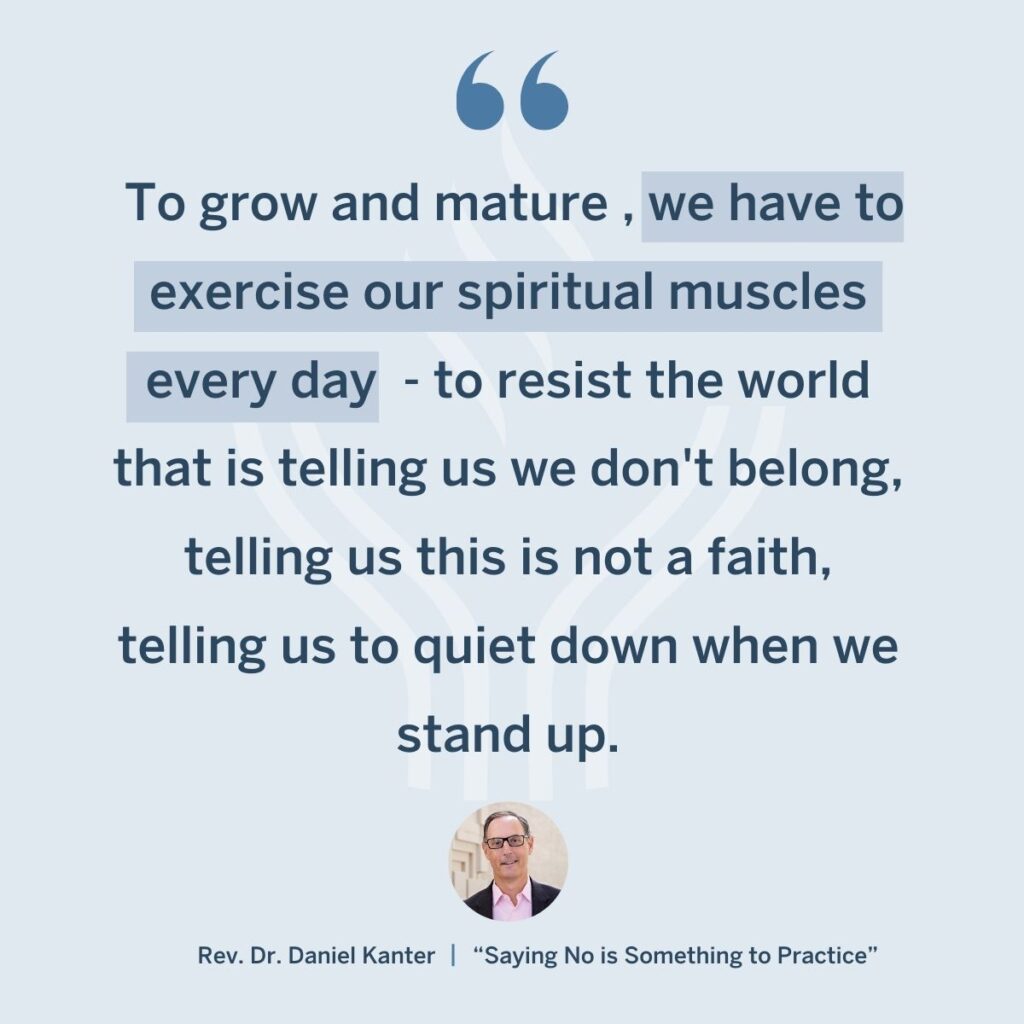Saying No is Something to Practice | Rev. Dr. Daniel Kanter | 01.28.24

The times we live in sometimes call us to say “no” – to resist those things that chip away at our integrity and our spirits.
In his sermon “Saying No is Something to Practice,” Rev. Dr. Daniel Kanter encourages us to exercise our spiritual muscles by resisting a world that tells us to quiet down when we stand up.

Sermon Transcript
Dr. Caryn Aviv’s talk: “Saying No is Saying Yes”
Some years ago I heard a talk by Dr. Caryn Aviv. She called the talk Saying No is Saying Yes. She’s a professor and she was teaching three classes a semester and a friend called her one day and asked her, “Can you walk my dog at 2:00 PM?” She said to her friend, “I have a class at 3:00 PM,” and then she said yes.
Imagine how that dog was feeling on that walk. She was aggravated. She was thinking to herself, “I’m too busy for this. Why am I doing this? This dog’s not even mine.” And then she realized that walking her friend’s dog in the middle of the day, just minutes before her students expected her, meant that she was saying yes too much. She asked in this talk, especially pointed at women, have you ever accepted a job where you didn’t get paid but should have? Have you told a white lie or felt guilty for saying no to a request or volunteer opportunity? Have you ever said yes instead of no and felt bad about it?
The reason we do this, she said, is people pleasing is a systemic problem where we look externally for affirmation, acceptance and approval. Am I talking to some of you here? Yeah, I know. I know. When we say yes when we mean no, we do it at the expense of ourselves. We undermine our integrity and our value. We say yes to the first salary offer or yes to jobs that don’t fit, yes to things that cut into our authenticity because they bring affirmation. So Caryn Aviv said in her talk saying no is hard because we fear we will not be loved or accepted.
But what if no takes control of situations, helps us state our needs, helps us create boundaries that are good, helps us accept the freedom and the liberation that comes with a no. The space to say yes. You see, no is power. A good no is about timing and logic. You should, and this is your minister speaking, you should on occasion say no to things that are not allowed, cannot be done, and on balance should not be done. And if you really need to know whether you’re making the right decision or not, just call and I’ll help you with that.
But a thoughtful no delivered at the right time can be time-saving for everyone down the road. A bad no hastily decided causes problems. Bad nos happen when you haven’t properly assessed the ask, when you let decisions be driven by personal bias, when you dislike the asker or they don’t seem important enough to you when you decline simply because you’ve said yes to too many things and don’t have capacity, that our job as spiritual people is to say no to the people and the things that deplete us of our authenticity, to make room for the people who see us and who love us into being.
And so Dr. Caryn’s commandments, she said, go like this, commandments to live by. She said, “I have more choices including no, I will be truthful and authentic. I will directly ask for what I need. I will live without resentment. I will honor my need for rest. I will not apologize for saying no. I will not compromise my integrity to please others. I will not say yes in ways that undermine my own power. I will take time if I feel ambivalent and I will say yes only when I really mean it.”
The Upside of Saying No
The upside to no is self-care and presence and resistance. No is the root of consent, the kind of consent that we teach our children about in sexual health. No is a way to combat distractions, to cultivate a presence to what and who is in front of us. No is resistance to paradigms that oppress. Saying no to business as usual, paradigms creates space for others to live with integrity also. Our resistance is required today on so many things in our society. Saying no to the government control of women’s bodies is a core mission of this church. The yes is that we will stand against laws that constrict freedom and we will stand with creative solutions.
We say no to wars waged in vengeance and no to organizations that use fear to achieve peace. Our time calls us to resist the numbing effect of the news made by politicians who want us to look over here while other atrocities and illegal acts are done to our land and our democracy and our native people and our integrity. Our times call us to use a no against things to resist those that chip away at our integrity and our spirits.
Remembering Robert Raible’s Acts of Resistance
I’m remembering Robert Raible, the minister of this church for 22 years from the early forties to the early sixties, he built up this church with a lot of yes and an equal measure of no. He put his ministry on the line officially to integrate this church in 1945, just three years into his ministry. When asked by the board chair would he have resigned if the board had voted not to welcome black citizens of Dallas into the sanctuary, he said, “I would have”.
He put his name on editorials that said no to desegregation in the Dallas schools and no to disparities in affordable housing and healthcare. These problems that have never been solved in our city, we still have work to do to resist city and state governments that continually push the poor further south and ignore the costs of healthcare. Raible said, “We build the church because we want to grow and mature with things of the spirit because we want to possess the values human and divine, which the church can inculcate in us and in our children.” And I know what he means.
In part to grow and mature and possess values human and divine, we have to exercise our spiritual muscles every day to resist the world that is telling us we don’t belong, telling us this is not a faith, telling us to quiet down when we stand up. I know from reading Raible sermons that he knew what it takes to have a special courage, to keep intact our integrity, to put away the distractions and be present to resist the headlong tumble of going along with the way things are or being torn apart by the way things are because they’re comfortable for the powerful or discomforting for us.
Our Act of Resistance: Coming to Church
And you know what else he knew, and I know and I think some of you know is an act of resistance and that’s coming to church, especially coming to this church. I’m not saying that to shame you into attending. You work that out for yourself, but I’m reading all those articles and I’m seeing all those books that you’re seeing all about the downfall of church. And what I see here is growth. I see young people joining the church because they want something that nourishes them in ways that social media can’t. I see people coming to make meaning and commit to something bigger. I see that as resistance to society that says none of this is important, and especially in this church where people don’t see a cross on the wall or on the steeple and tell us this isn’t a religion coming here to build our collective power is resistance to those forces that want to eliminate who we are.
Yesterday, the leadership seminar here at the church read parts of the founding sermon of our church in May 12th, 1899, where Reverend Daniel Limbaugh said a few radical things to a group of renegade Unitarians in Dallas who were sitting in a Jewish temple because it was the only place of worship that would have them. He said some familiar things that you could probably quote, those of you who have been around about the old creeds are outdated and people are outgrowing the old dogmas. Then he said, “And I cannot say anything to prove that there is hope in me,” he said, “Except that this faith can grow here because we are here. Because we are here.”
He was naming a moment of resistance for people in 1899 who were looking at their families and their neighbors and their friends and saying, “We are not Trinitarians. We are Unitarians. We are going to be a religion of love,” they said, “We are here because of the power beyond us and within us,” he said, “A power that gives us life, a God that is love, a revelation of what is real that is not stationary or stuck in one story. And they and we are here because,” as I quote Daniel Limbaugh, “We are here to ask ourselves, what shall I do with my life? How can I make the most of it?” And the answer he said was character building and soul development.
What was true for the Unitarian sitting in our church in 1899 is true for us today, an act of resistance to those who say that religion matters not, an act of resistance to those big steeples in our city who say, this is not a religion. It matters that they met so long ago to say no to the way things were in Dallas in 1899, in their families, in their faiths, that they embraced for a new horizon that spelled freedom, that spelled a loving God that said, we do not have original sin. It mattered then and it matters now that we say no to all the things telling us that this church doesn’t matter. It mattered to them as it does to us today.
That commitments to this religious story, which still says the old dogmas and doctrines and creeds appear outgrown, and we practice the religion of love for the good of all. It matters as it did then to us to say no to those who look at us and say, we do not matter. Friends, today is not no day. Don’t go around throwing that word at your friends or family, but I want you to consider where it should play in your spiritual life, in protecting your honor, in holding those around you accountable, in joining you in a resistance movement that stands for the values you care about. May you find a no at all the appropriate times in your life to free you, to hold you, and to empower you to be the best person you can be. May it be so and amen.








